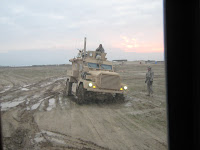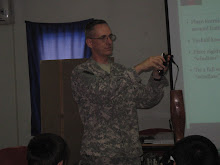There are some issues or events that never even make it to a post. Others, like today's, I have to think about for a long time before posting since I endeavor to be positive about our role here. Today's issue still has the potential to be a rant instead of informative.
Basic Warfare 101 teaches us that armed conflict is just an extension of diplomacy. There is a published Army Field Manual that provides guidance on the use of money as a weapons system. Out of all the tools at our disposal to effect positive change in this country, money is the most effective.
There are several programs by which mentors can buy goods or services for their Afghan counterparts. One of these programs is

the Field Ordering Officer or FOO program. Others include the Commanders Emergency Relief Program (CERP), PR&C projects, and many more lesser known acronyms. The only one we really heard about in mentor training was FOO. The obvious goal of mentoring is to coach the Afghans so they can successfully navigate their own logistics systems and ensure they are self sufficient. Sometimes, however, we cannot let them fail. Sometimes we need to spend money to ensure they can complete their mission of securing Afghanistan. Most people with experience would agree that logistical planning is not a strong suit for the Afghans. The FOO program exists to fill in the shortfalls in logistical planning so that the Afghans can continue their mission in a timely manner. It requires a two person US team to go through a short course, then be responsible and accountable for money signed over by the US Government. Above is a picture of my most recent draw of FOO money. It is a stack of bills that equals 1 million Afghani. The US equivalent is $20,000. It is a lot of money, and our team only spent a small fraction of it.
Unfortunately the accountants and contact clearance personnel in Kabul have essentially scuttled this program. What may have been a useful program to offset shortcomings in the Afghan military planning process is now useless. About two months into our time here a new team of accountants at Kabul took over and radically changed the rules of what could be bought and how it was justified. All purchases were questioned from that point onwards and items that were retrospectively considered unauthorized were billed to the team personally. The result is that teams are now fearful of spending any money to support the mission. We can either assume that the Afghans have totally figured out how to work their system in the past 4 months(very unlikely), or that the mission is suffering. What is more there are lots of hardworking American soldiers who are now being held financially responsible for purchases they thought were in good faith. I know of at least three teams in the northern area who are being held personally financially responsible for purchases which seem to fulfill the intent, if not the letter of the regulations.
One Army National Guard Lt is having to pay $900 dollars out of his own pocket to reimburse the government for 'unauthorized purchases'. He bought water for the Afghan National Army so that they could complete a field mission. Another Army National Guard soldier is being held responsible for $300. He used FOO money to contract some wiring for a refrigerated container for an ANA kitchen. We all know that soldiers fight better when they are fed spoiled food. Another team paid $180 for parts and wiring to fix washing machines that were broken at an Afghan army hospital (who knew that hospitals had to have clean linen?) Somehow it does not seem right that soldiers of conscience who were trying to directly impact and benefit the Afghan mission here should have to pay (literally) for their service.
On the other hand, for many years now I have always applied the 'Uncle Dale' Principle to spending the Government's money. My Uncle Dale, a proud taxpayer, was astounded one year to find that the Navy paid rent for us to live in a nice house in Italy while we were stationed there. Since that time I have always considered whether or not my Uncle Dale would approve spending that I might do on his behalf.
But lets also put this in larger perspective. How much has the US spent on me so far during this deployment? If you add up three months of training, cost of contract instructors, ammunition, fuel, my salary, food, housing, transportation, and additional deployment pays, it is a lot. I would guess that the US has spent about $500,000 just to get me trained and here. So why quibble about a paltry few hundred dollars spent directly on the mission? Besides, who can better decide what is necessary to accomplish the mission at hand: mentors who work with the Afghans daily, or accountants in Kabul? It almost appears that the HQ in Kabul seems intent on undermining this program and therefore our direct mentoring efforts. We are here to teach the Afghans how to think for themselves, plan ahead and succeed. How unfortunate it is that we seem to have learned from the Afghan(Russian old style centralized command) system, instead of them learning from us.
If the American people want to know why we are not making more progress with the Afghan National Security Forces, they need look no further than the FOO program and how it has been hamstrung.
 Weeks ago when we were talking and having chai with our ANP counterparts the topic of weapons came up. Our counterparts relayed to us that they had not been trained on their pistols and were not very comfortable with their use. Since they do carry these weapons and rely on them for their personal safety, we decided to arrange some time together on the range to practice. After a basic range safety lecture through my interpreter, we began.
Weeks ago when we were talking and having chai with our ANP counterparts the topic of weapons came up. Our counterparts relayed to us that they had not been trained on their pistols and were not very comfortable with their use. Since they do carry these weapons and rely on them for their personal safety, we decided to arrange some time together on the range to practice. After a basic range safety lecture through my interpreter, we began. find that they carry new Smith and Wesson 9mm pistols. Their pistols did not have a safety, but were light weight and handled well. One of the weapons misfired a few times, but I suspect that more oil was needed. They did fine and improved with only a little practice. We also let them shoot our pistols, which are much older in design comparitively. We ended the shooting with a familiarization fire of the M-4 which was orderly as well.
find that they carry new Smith and Wesson 9mm pistols. Their pistols did not have a safety, but were light weight and handled well. One of the weapons misfired a few times, but I suspect that more oil was needed. They did fine and improved with only a little practice. We also let them shoot our pistols, which are much older in design comparitively. We ended the shooting with a familiarization fire of the M-4 which was orderly as well. universally said it was much harder to hit a golf ball than watching TV might suggest. I was worried that some of the clubs would be literally broken in half due to the hatchet like swing of some of the new golf initiates. There were quite a few laughs and a good time was had by all. It was a good safe time. I suspect this was the last mentoring type activity I will perform in this country. There is a new member of the team here now, so very soon it will be time for me to move on.
universally said it was much harder to hit a golf ball than watching TV might suggest. I was worried that some of the clubs would be literally broken in half due to the hatchet like swing of some of the new golf initiates. There were quite a few laughs and a good time was had by all. It was a good safe time. I suspect this was the last mentoring type activity I will perform in this country. There is a new member of the team here now, so very soon it will be time for me to move on. 






















